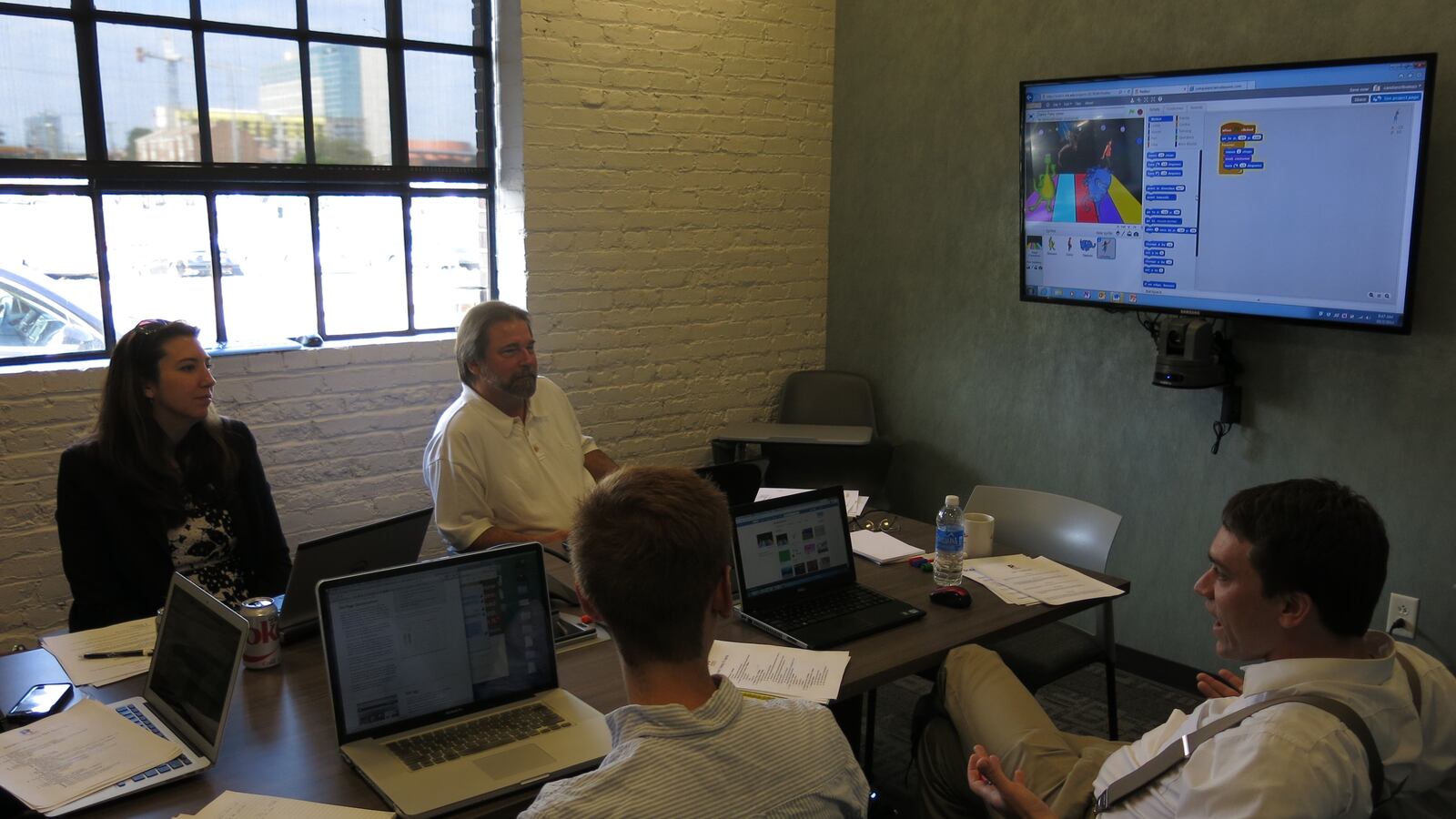Dinosaurs disco-danced across the screen in the conference room where three Nashville educators were working on a curriculum to teach middle school students computer programming Thursday morning.
Ryan York, the director of computer programming instruction for charter network RePublic Schools, was sharing the curriculum developed by him and his colleagues with Julie Hasfjord, the Instructional Leader for STEM Integration for Bailey STEM Magnet Middle School, and Thomas Trenkler, a technology teacher at Apollo Middle Prep.
Why teach coding — a skill typically relegated to college coursework — to middle school students? York said he could hardly keep track of the answers: It teaches problem solving skills, gives student a platform to apply math skills, and requires creativity.
And, he said, it’s something that can put the students at RePublic schools — the majority of whom are from low-income families — at an advantage when they enter the job market.
“We don’t just want our kids caught up,” York said. “We want them to be ahead.” But RePublic officials don’t want their kids to be the only ones with such a potentially lucrative skill. York pointed out that, already, there are far more jobs requiring coding than people who know how to do it.
That’s why he and Ravi Gupta, RePublic’s founder, wanted an open source curriculum, available to teachers at any school for free.
“We wanted to create a model of [teaching coding] that was free and replicable,” Gupta said. “The crazy thing about where we are right now, is that despite the fact that we all depend on these tools, almost nobody we know knows how to create these tools.
But while wanting to teach kids to code is all well and good, actually doing it is harder. People who have skills in computer coding are qualified for some of the world’s most lucrative jobs, York said. Few are interested in teaching middle school. And there isn’t a lot of material for middle school students out there. Curriculum existed to teach advanced high schoolers coding, but York had little basis for a fifth-grade friendly way to teach coding. Through a resource developed by the Massachusetts Institute of Technology, called Scratch, he developed a semester’s curriculum, which he and other teachers in the RePublic network began to teach this fall. Since most teachers don’t have coding experience, the idea of his curriculum is that teachers can learn alongside their students, Gupta said.
York’s currently at work on a four-year curriculum that will span all of middle school, and looking into grants so RePublic can add another computer coding position, and train more teachers across the state.
York was a teacher first, then a coder. Three years ago, he learned to code through online tutorials and trial-and-error after being frustrated by a lack of programs to organize and track his students’ data. He ended up with a successful program called My Class Progress, which allowed him to keep track of what each student needed to work on according to online quiz results. His dual passions of coding and teaching made York a good fit for RePublic officials, who were searching for someone to teach coding in their three Nashville middle schools, which serve. They had almost given up on their search when they discovered York at an education and tech conference held at Nashville Prep, a RePublic school. York had been right under their noses, teaching math at Apollo Middle Prep.
Now York is training Hasfjord and Trenkler in a three-part, semester long course, with a four-hour training for each part. Hasfjord and Trenkler will teach the course in the spring semester. By the end of the semester course, students at their schools will be beyond the dinosaurs at Scratch, and building their own websites and computer games.
“A lot of times our kids start off saying, ‘Well, I don’t want to be a computer programmer, I want to be in the army,” York said. “Well, let me tell you something; there’s a lot, lot, lot, you can do for the army if you can code. Agriculture, sports, television, media, all of that is using computer programmers.
Trenkler thought kids would get a kick out of making their own videos.
“This is the video age, and our kids are really into that,” he said. “We figure that we’ll probably have some students get really interested in this and follow this into higher education.”
“This makes me feel very smart,” Hasfjord said as she fixed a bug in a module where students make a cartoon character kick a soccer ball. “I can imagine how empowering this will be for the kids.”
“Absolutely,” agreed York. “You’re making things. We talk a lot in education about technology from the stance of students being consumers, but we don’t spend a lot of time talking about them being creators.”


